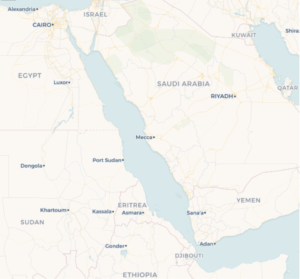As a result of the attack on Iran, nitrogen fertilizer at the port of New Orleans has seen an increase in price this week. Urea prices for barges in New…
Red Sea Attacks Continue, Could Affect U.S. Corn
Reuters reported yesterday that “U.S. and British naval forces shot down 21 drones and missiles fired by Yemen-based Houthis on Tuesday towards the southern Red Sea, the United States said, with Britain hinting at further measures to protect international shipping lanes.”
The attack was the largest attack by the Houthis in the Red Sea since mid-November, Reuters reported, and is the 26th “attack on commercial shipping lanes in the Red Sea.”
Overnight @HMSDiamond alongside US vessels repelled the largest and most complex attack by Houthis in the Red Sea to date.
Nearly 15% of global seaborne trade passes through the Red Sea.
Attacks to commercial shipping jeopardise the movement of goods worldwide. pic.twitter.com/ihOoyK7Hje
— Ministry of Defence 🇬🇧 (@DefenceHQ) January 10, 2024
CNBC’s Lori Ann LaRocco reported last week that shipping companies “have already diverted more than $200 billion in trade over the past several weeks away from the crucial Middle East trade route, which, along with the Suez Canal, connects the Mediterranean Sea to the Indian Ocean.”
The trade route handles “about 15% of the world’s shipping traffic,” the Reuters article reported.
“This has created a multiple-front storm for global trade, according to logistics managers: Freight rates increasing daily, additional surcharges, longer shipping times, and the threat that spring and summer products will be late due to vessels arriving late in China as they travel the long way around South Africa’s Cape of Good Hope,” LaRocco reported.

Shipping companies that have diverted ships away from the Red Sea include shipping giants Maersk, Hapag-Lloyd and the Mediterranean Shipping Company (MSC), according to TIME reporter Simmone Shah.
While much of what is moved through the Red Sea is reported to not have much effect on U.S agriculture in the short term, AgWeb’s Tyne Morgan reports that it could have a positive effect for U.S. farmers if the conflicts continue.
“Dan Basse of AgResource Company says the shipping issues in the area are a big concern for agriculture, specifically for Ukrainian exports,” Morgan reported.
“He says while it’s causing chaos in the Red Sea, it could be a positive for the U.S. market, as U.S. corn may be needed to replace that Ukrainian business. ‘I think you’re going to find a little U.S. corn supplementing that Ukrainian business. It’s going to be positive for the U.S. market. I think it’s something in agriculture, we need to be watching carefully,’ says Basse.'”
The impacts on U.S. agriculture may not be completely positive, however, as the American Farm Bureau Federation reports that “Long-term disruptions though can have impacts on U.S. farmers. We are already seeing that surcharges have been added onto a lot of ag exporters already without a 30 day notice which is actually mandated by the Federal Maritime Commission, so it won’t be long until farmers who have exported goods to those regions may feel a pinch.”
While it is unknown how long the Houthi attacks may continue in the Red Sea, Reuters reported that retailers are preparing for the conflict to continue by “stocking up on goods before China’s Lunar New Year holiday and seeking air or rail alternatives to avoid empty shelves this spring.”





